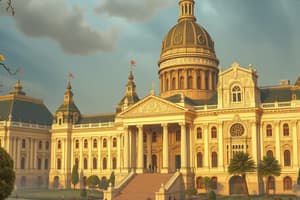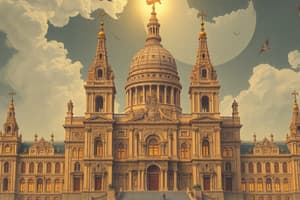Podcast
Questions and Answers
Which feature distinguishes a direct democracy from a representative democracy?
Which feature distinguishes a direct democracy from a representative democracy?
- Majority rules without restrictions
- Citizens vote on laws directly (correct)
- Power resides with a single ruler
- Decisions are made by elected officials
What are the four components that define a sovereign state?
What are the four components that define a sovereign state?
- Population, territory, treaties, and governance
- Population, government, resources, and economy
- Boundary, laws, territory, and government
- Population, territory, sovereignty, and recognition (correct)
Which of the following best describes an oligarchy?
Which of the following best describes an oligarchy?
- Leadership derived from religious leaders
- Government by a few powerful individuals (correct)
- A system where laws are made by citizens
- Rule by a single individual
What is one of the six goals of the U.S. Constitution outlined in the Preamble?
What is one of the six goals of the U.S. Constitution outlined in the Preamble?
Which branch of government is primarily responsible for making laws?
Which branch of government is primarily responsible for making laws?
What is the purpose of the Bill of Rights?
What is the purpose of the Bill of Rights?
Which of the following best defines federalism?
Which of the following best defines federalism?
Which amendment addresses the right to bear arms?
Which amendment addresses the right to bear arms?
Flashcards
Sovereign State
Sovereign State
A state that has supreme and independent authority within its territory, with no higher power above it. It is a self-governing entity with its own laws and internal affairs.
Components of a Sovereign State
Components of a Sovereign State
A sovereign state has four key components:
- Population: A group of people living within a defined territory
- Territory: A specific area with defined boundaries
- Sovereignty: The power to make and enforce laws within its territory
- Government: The system that makes, enforces, and interprets laws.
Direct Democracy
Direct Democracy
A form of government where citizens directly participate in decision-making through votes and referendums. Everyone has a say!
Representative Democracy
Representative Democracy
Signup and view all the flashcards
The Preamble
The Preamble
Signup and view all the flashcards
The 3 Branches of Government
The 3 Branches of Government
Signup and view all the flashcards
The Bill of Rights
The Bill of Rights
Signup and view all the flashcards
Amendments
Amendments
Signup and view all the flashcards
Study Notes
Types of Government
- Autocracy: Rule by one person, with absolute power.
- Monarchy: Rule by a king or queen, often hereditary.
- Dictatorship: Rule by one person or a small group, gaining power through force or intimidation.
- Democracy: Rule by the people, where citizens have a say in government decisions.
- Representative Democracy: Citizens elect representatives to make decisions on their behalf.
- Direct Democracy: Citizens directly vote on laws and policies.
- Oligarchy: Rule by a small group of powerful people.
- Junta: A military group that seizes power and rules.
- Theocracy: Government ruled by religious leaders.
- Anarchy: Absence of government.
- Revolution: A significant change in government through revolt.
Sovereign State
- A sovereign state is an independent political entity.
- Its four components are:
- Population: the people living within its borders.
- Territory: the land and resources within its borders.
- Sovereignty: the ultimate power to govern itself.
- Government: the system that operates the state.
Roles of Government
- A government's four main roles in a sovereign state are:
- Maintain order
- Provide services
- Enforce laws
- Protect its citizens
Forms of Democracy
- Direct democracy: Citizens vote directly on laws and policies.
- Representative democracy: Citizens elect representatives to make decisions on their behalf.
US Constitution Preamble
- The US Constitution Preamble outlines the six goals of the government.
- Three examples of goals:
- Establish justice
- Ensure domestic tranquility
- Provide for the common defense
Branches of US Government
- Legislative Branch (Congress): Makes laws.
- Congress is made up of the Senate and the House of Representatives.
- Executive Branch: Enforces laws. The President is the head.
- Judicial Branch (Supreme Court): Interprets laws. The Supreme Court is the highest court.
US Constitution Articles
- The Constitution is divided into articles, each with a specific function. Students should know the purpose of each.
Bill of Rights (Amendments 1-10)
- The Bill of Rights protects the basic rights of US citizens.
- Students should be able to summarize the key rights guaranteed by each of the first ten amendments. E.g., 1st Amendment: freedom of speech, religion, press, etc.
Studying That Suits You
Use AI to generate personalized quizzes and flashcards to suit your learning preferences.




